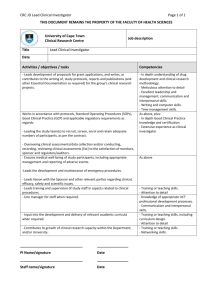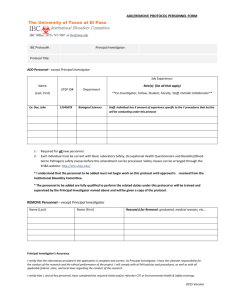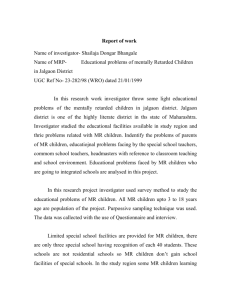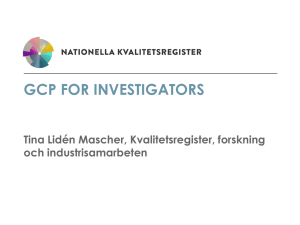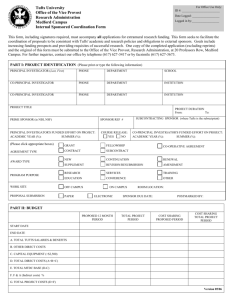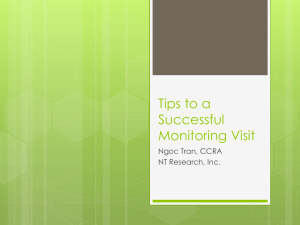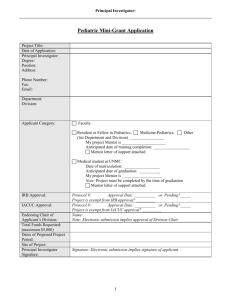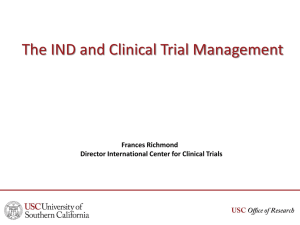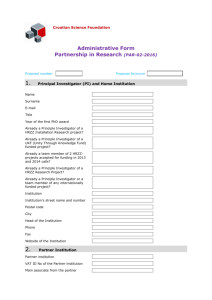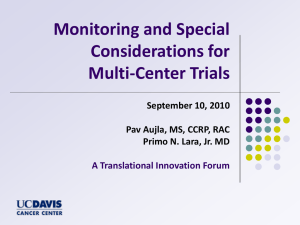Essential Documentation GCP Training Day
advertisement
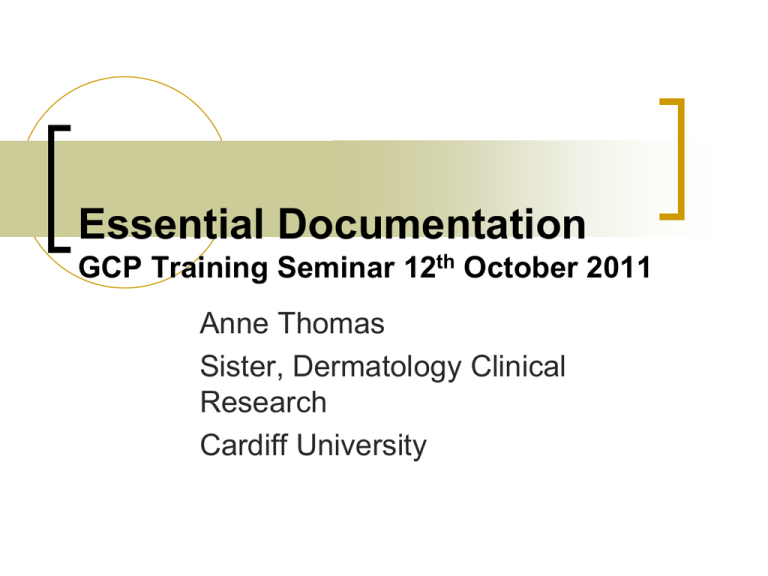
Essential Documentation GCP Training Seminar 12th October 2011 Anne Thomas Sister, Dermatology Clinical Research Cardiff University Introduction ‘Essential documents are those documents, which individually and collectively permit evaluation of the conduct of the trial and the quality of the data produced.’ International Conference on Harmonisation (ICH) Guidelines for Good Clinical Practice Good Clinical Practice ‘These essential documents serve to demonstrate the compliance of an investigator, sponsor and monitor with the standards of Good Clinical Practice and with all regulatory requirements’ Maintaining Good Files “Adhering to GCP is one thing, but proving that this has been done is another. For a trial to be credible in the eyes of the authorities, investigators must be able to show that the study is in compliance with GCP guidelines. This means documenting every study-related action” (Hutchinson 2009). Hutchinson (20099) 12 Golden GCP Rules for Investigators. Canary Publications, London. ICH guideline for Good Clinical Practice Booklet produced by the ICH Secretariat Contains a list of Essential Documents (Section 8) Trial file It is a good practice to dedicate a member of the research staff for maintenance and updating of the trial file. Filing of essential documents at the investigator/institution and sponsor sites in a timely manner can greatly assist in the smooth running of the trial Version Control It is essential that all users of a controlled document use the most up to date version in order to ensure that accurate procedures are being followed at all times It is essential that an audit trail of version controlled documents is made available once a document is approved for use and subsequently reviewed and/or changed Version control Once approved the final version is Version 1.0 with approval date Minor administrative changes renumbered using decimal point i.e. 1.1, 1.2 etc with date change If substantial amendments are made the version number increases incrementally with each change to Version 2.0, Version 3.0 etc and dated Version Control Updated versions of the protocol, information sheets and consent forms will supersede previous documents. It is a good idea to keep a table inside the front cover of the site file listing the current approved documents with their version numbers and dates. Three Sections The various documents are grouped in three sections according to the stage of the trial Three Stages 1. 2. 3. Before the trial commences During the clinical conduct of the trial After completion or termination of the trial We are going to look at what the investigator/researcher needs to document, but you also need to be aware that the trial Sponsor will also be obliged to keep a file. Before the Trial Investigator File (Trial Site File, TSF) Standard in commercial trials Need to produce own for academic research / ‘in-house’ studies Investigator File File will contain: Signed protocol or research proposal Patient Information Sheet (blank) Patient Consent Form (blank) Advertisement for patient recruitment Trust R&D approval documentation Ethics approval documentation Investigator File CV of all researchers involved Signature/Delegation log Access to medical notes approval Clinical Trial Agreement (if appropriate) Investigator’s Brochure provided by pharmaceutical sponsor detailing relevant and current scientific information about the investigational product (or other supporting data) Investigator File Normal values for medical/laboratory procedures and tests Lab Accreditation certificates/CVs Calibration certificates for technical equipment Instructions and documentation for the handling/transporting of any trial medication and related materials Investigator File Standard Operating Procedures (SOPS) Copies of questionnaires Letters to patient’s GP/consultant Decoding procedures for blinded trials Master randomisation list Trial initiation report for sponsored studies During the Trial Any protocol amendments Any updates to Investigator Brochure, CRF, Ethics, R&D etc. Signed patient consent forms All relevant correspondence Notification of serious adverse events Interim reports During the Trial Subject Identification Log Confidential - for researcher only Each patient’s address, date of birth, hospital number – they may need to be identified at a later date Subject Enrolment Log Documents enrolment of subjects by trial number, subject not identified During the Trial Drug Dispensing Log Drug Accountability Log These may be held in Trial Pharmacy file, along with code breaks if appropriate After completion of the Trial Final close-out monitoring reports Decoding documentation Completed Subject ID code list Drug Accountability and Returns Audit Certificate Final Report To Ethics and R&D Clinical study report Recording Data Complete the CRF fully and legibly Use a black pen – Any corrections should be signed and dated, with a comment (if necessary) – Never use tippex. The corrected data must be visible – The first place you write down data is the source document. Do not use scraps of paper, paper towels, hands etc Trial Files and Archives The investigator should set up studyspecific files in which all appropriate documentation is filed All study documents must be stored in a safe, secure and confidential environment Avoid leaving files lying around Treat source documents like ‘gold’ and ensure that they do not get lost or destroyed prematurely. Keep for up to 15 years Includes medical notes, X-rays, tissue samples, CRFs Data Quality All trial data needs to be recorded accurately in the CRFs, medical notes and any questionnaires The success of every clinical trial is dependent on the reliability and quality of the data collected and analysed If this data is not documented accurately it will affect all aspects of the research Preparation Labels on medical records Inside cover; commercial and academic studies, must include trial name and R&D number, name of principal investigator and contact details Label on outside cover (orange for UHW!): medical records should not be digitised if patient has been part of any research study Pre-study preparation Prepare all documentation prior to starting the study, including making up all CRFs, having storage for blood samples etc. Archiving Archiving in the context of clinical research relates to the collection of essential documents, which individually and collectively permit the evaluation of the conduct of the trial, and the quality of data produced for long-term storage CU ~ The Maltings Cardiff & Vale UHB ~ Eltham Lewis Associates, Newport Archiving It is the responsibility of the principal investigator to arrange for the archiving of research data Where applicable, negotiate with the commercial company a payment for the archiving of site documents at a GCP compliant facility Once the study has ended, the investigator is obliged to keep studyrelated documents for a long period of time, often as long as 15 years Good Clinical Practice Compliance with ICH-GCP is essential for both commercial and in-house trials And Finally… Above all remember: If it is not written down, it did not happen!!! If it is not documented, it doesn’t exist.!!!
